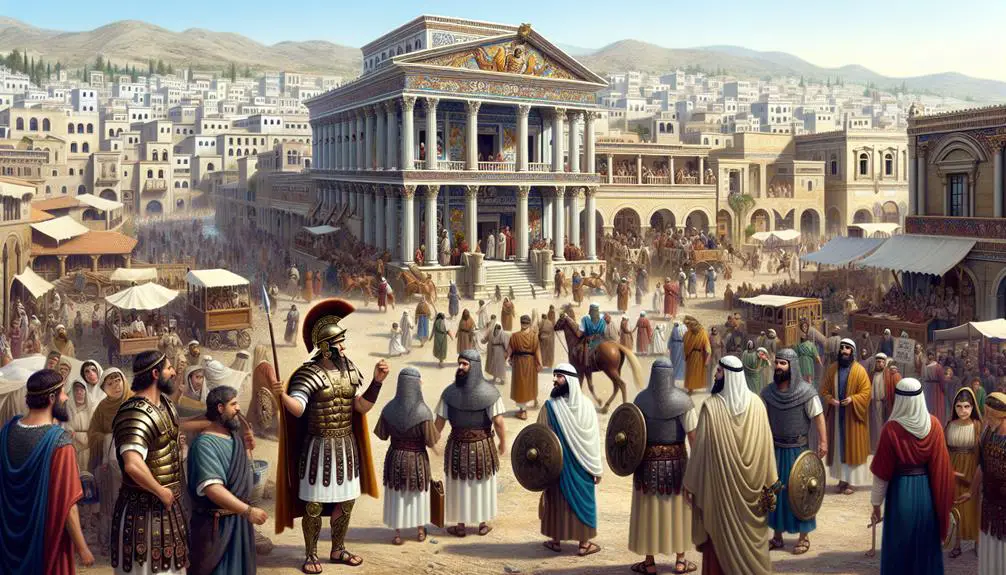A Roman procurator with a controversial rule, Felix's biblical story intertwines power, justice, and an unforgettable encounter with Paul the Apostle.

Who Was Felix in the Bible
Opening your latest browser tab, you might not expect to stumble across a figure like Felix from the ancient texts of the Bible.
As the Roman procurator of Judea, his tenure was marked by political intrigues and a significant encounter with Paul the Apostle, casting a long shadow over early Christian history.
Yet, despite his high office, Felix's approach to governance and his moral compass remain subjects of debate among scholars and theologians.
What was it about Felix that left such an indelible mark on history, and why does his story still resonate with us today?
Uncover the layers of his complex legacy to find out.
Key Takeaways
- Felix served as the Roman procurator of Judea, showcasing a mix of political maneuvering and opportunism.
- His governance was marked by judicial corruption and prioritization of personal wealth over equitable justice.
- Felix had a significant encounter with Apostle Paul, choosing to keep him imprisoned without clear evidence.
- His rule impacted early Christianity and shaped Roman-Jewish relations through a blend of religious tolerance and political expediency.
Historical Background of Felix

To understand the role of Felix in the Bible, it's essential to delve into his historical context as a Roman procurator of Judea. His tenure, marked by political maneuverings and the establishment of Roman alliances, sheds light on the complexities of governance during this tumultuous period in Judea's history. Felix's role wasn't merely administrative; it was deeply intertwined with the broader objectives of the Roman Empire, aiming to maintain peace and order in a region known for its unrest.
Felix's personal life also plays a crucial role in understanding his historical background. His marriage to Drusilla, a member of the Herodian dynasty, is particularly noteworthy. This alliance through marriage underscores the strategic connections Felix cultivated, bridging Roman authority with local governance. Such alliances were instrumental in stabilizing Roman rule, allowing Felix to navigate the intricacies of local politics and societal tensions.
Moreover, his personal ambitions and relationships significantly influenced his decisions as procurator. Felix's quest for personal gain and stability often intersected with his official duties, impacting how he managed conflicts and interacted with both the Jewish population and the Roman hierarchy. This intersection of personal and political spheres highlights the complex nature of Roman rule in Judea, illustrating how personal motivations could shape broader political strategies.
Felix's Role as Procurator

As procurator of Judea, Felix wielded significant authority, navigating the complex political landscape with a blend of diplomacy and force to maintain Roman control and influence in the region. His tenure was marked by a delicate balance of power, where his actions directly impacted the stability and peace within Judea. Felix's approach to governance was multifaceted, involving strategic political alliances and personal relationships, notably through his marriage, which played a crucial role in his administration.
To understand Felix's role as procurator, consider the following key aspects:
- Felix's Marriage: Felix's marriage to Drusilla, a Jewish princess, wasn't merely a personal affair but a strategic alliance that helped solidify his position within Judea. This union served as a bridge between Roman authority and Jewish aristocracy, facilitating smoother governance and offering Felix insight into Jewish customs and sentiments.
- Political Alliances: Felix carefully cultivated political alliances with various factions within Judea and the broader Roman Empire. These alliances were essential for maintaining peace and order, as they allowed him to navigate the region's complex social and religious dynamics effectively.
- Administrative Strategies: Felix employed a combination of diplomatic negotiations and military interventions to address internal unrest and external threats. His ability to adapt his strategies according to the situation helped in preserving Roman interests while attempting to minimize open conflict.
Encounter With Paul the Apostle

Felix's tenure as procurator also encompassed a significant encounter with Paul the Apostle, reflecting his intricate role in the religious and political dynamics of Judea. This meeting between Felix and Paul is pivotal, offering insight into Felix's temperament and his handling of judicial affairs, especially those imbued with religious implications.
When analyzing Felix's temperament during Paul's defense, you observe a man swayed by various external and personal influences. Historically, Felix is noted for his harsh rule and tendency towards cruelty and greed. However, during Paul's defense, there's a nuanced depiction of Felix. He appears somewhat intrigued by Paul's teachings, yet his actions are restrained by political expediency and personal gain. Felix's decision to keep Paul imprisoned, despite acknowledging the lack of evidence against him, underscores a complex interplay of fear, curiosity, and opportunism.
Paul's defense, on the other hand, showcases his eloquence, courage, and unwavering faith. He seizes the opportunity to articulate his beliefs before Felix, presenting a defense that's both a personal testament and a strategic appeal to the broader philosophical and religious curiosities of his audience. Paul's approach isn't merely a legal defense but an evangelical moment, aiming to enlighten and convert.
This encounter is emblematic of the broader tensions within Judea, capturing a moment where personal beliefs, political power, and judicial proceedings intersect. Felix's reaction to Paul's defense, marked by procrastination and indecisiveness, reveals the precarious balance of power and the complexities of governance in a province fraught with religious and political strife.
Felix's Approach to Governance

An examination of his tenure reveals that Felix governed Judea with a blend of pragmatism and opportunism, often prioritizing personal gain over equitable justice. This approach manifested in various aspects of his governance, particularly in areas of judicial corruption and economic policies.
- Judicial Corruption: Felix's administration was marred by instances of judicial malpractice. You'll find that he often used his authority to manipulate legal outcomes. For instance, he was known to accept bribes in exchange for favorable judgments or to delay trials indefinitely, leveraging his position for personal enrichment rather than serving the principles of justice. This practice not only eroded public trust in the legal system but also contributed to the wider climate of dissatisfaction and unrest.
- Economic Policies: Felix's economic policies reflected his opportunistic approach to governance. Rather than implementing reforms that would benefit the broader populace, he focused on schemes that would increase his wealth. This included heavy taxation and the seizure of properties under dubious legal pretexts. Such policies exacerbated the economic burdens on Judeans, increasing social tensions and contributing to the instability of the region.
- Exploitation of Power for Personal Gain: Beyond judicial corruption and economic manipulation, Felix's tenure was characterized by a general exploitation of power for personal gain. He engaged in alliances and political maneuvering that prioritized his interests, often at the expense of peace and prosperity in Judea.
Legacy and Historical Impact

The legacy of Felix's governance, marked by corruption and opportunism, continues to shape historical assessments of his rule in Judea. Scholars evaluate Felix's character through the lenses of his actions and decisions, which reveal a complex interplay between personal ambition and the pressures of Roman imperial politics. His tenure, characterized by a lack of moral scruples and an inclination towards exploiting his position for personal gain, casts a long shadow over the historical narrative of Roman administration in the region.
You'll find that Felix's interactions with the early Christian community, as depicted in the Acts of the Apostles, underscore the religious implications of his governance. His ambivalence towards the nascent Christian sect, combined with a pragmatic approach to maintaining public order, reflects a broader Roman policy of religious tolerance complicated by political expediency. Felix's decision to keep the Apostle Paul in custody, ostensibly awaiting a bribe, exemplifies his opportunistic approach, balancing the appeasement of Jewish authorities with the potential for personal enrichment.
The examination of Felix's legacy isn't just an analysis of a historical figure's personal failings or the specifics of his administrative practices. It's an exploration of the broader implications of his rule on the development of early Christianity and the dynamics of Roman-Jewish relations. Through Felix, you gain insights into the complexities of governance in a multi-ethnic, multi-religious empire and the enduring impact of individual leadership styles on historical trajectories. His story, steeped in corruption and political maneuvering, offers a unique perspective on the challenges of maintaining peace and justice in a diverse and often volatile society.
Frequently Asked Questions
How Did Felix's Personal Life and Relationships Influence His Decision-Making as a Procurator?
In examining your decision-making as a procurator, it's clear that marital influence significantly shaped your leadership style. Your personal relationships, particularly your marriage, didn't just affect your private life; they deeply impacted how you handled professional duties.
This intertwining of the personal and professional realms suggests that those closest to you had a considerable sway over your decisions, highlighting the complex interaction between your intimate life and your approach to governance.
Are There Any Contemporary Sources Outside the Bible That Provide Additional Insights Into Felix's Character or Actions?
You're diving into a treasure trove of history, searching for the golden insights of Roman historians on Felix's legacy.
Believe it or not, beyond the biblical narrative, these ancient scribes offer a less divine, more earthly perspective on his actions and character.
Analyzing their texts, you unearth a scholarly, objective analysis, piecing together a complex portrait.
This external evidence enriches your understanding, providing a fuller, more nuanced view of his impact and persona.
How Did Felix's Tenure as Procurator Compare to That of His Predecessors and Successors in Terms of Administrative Reforms or Policies?
You're exploring how a certain procurator's tenure stands out from his predecessors and successors, focusing on economic policies and security measures. Analyzing his administration reveals a distinct approach to governance, marked by specific reforms or policies that differentiated his tenure.
It's crucial to weigh these actions against those of others in the same role, assessing their impact on economic stability and security, to fully understand his unique contribution to administrative practices during his time in office.
What Were the Cultural and Religious Dynamics in Judea During Felix's Rule, and How Did He Navigate These Complexities?
Navigating Judean politics during Felix's rule was like walking a tightrope above a cultural chasm.
You'd find a complex interplay of local traditions and Roman influence, with Felix balancing these forces carefully.
His approach to governing reflected an understanding of the delicate religious and social dynamics at play.
Analyzing his tenure, it's clear that he maneuvered through these complexities with a focus on maintaining peace and stability amidst a diverse and often fractious society.
Can Any Archaeological Findings Be Directly Attributed to Felix's Governance or Personal Life, Shedding Light on His Era or Lifestyle?
You're diving into whether archaeological findings can be pinned to Felix's governance or personal life. Specifically, coin identification and architectural remnants offer insights.
Through coins, you discern economic and political climates, while architectural remnants reveal societal structures and personal tastes.
Analyzing these artifacts, you uncover layers of history, piecing together a narrative of Felix's era and lifestyle. Such analysis is scholarly, grounding your understanding of his impact in objective, tangible evidence.
Conclusion
In conclusion, you may argue that Felix's historical significance is overshadowed by more prominent figures of his time.
However, understanding his role as procurator and his interactions with Paul the Apostle offers valuable insights into the complexities of governance and justice in ancient Judea.
His approach, marked by a blend of pragmatism and opportunism, not only shaped his legacy but also provides a nuanced perspective on the political and social dynamics of the early Roman Empire.



Sign up